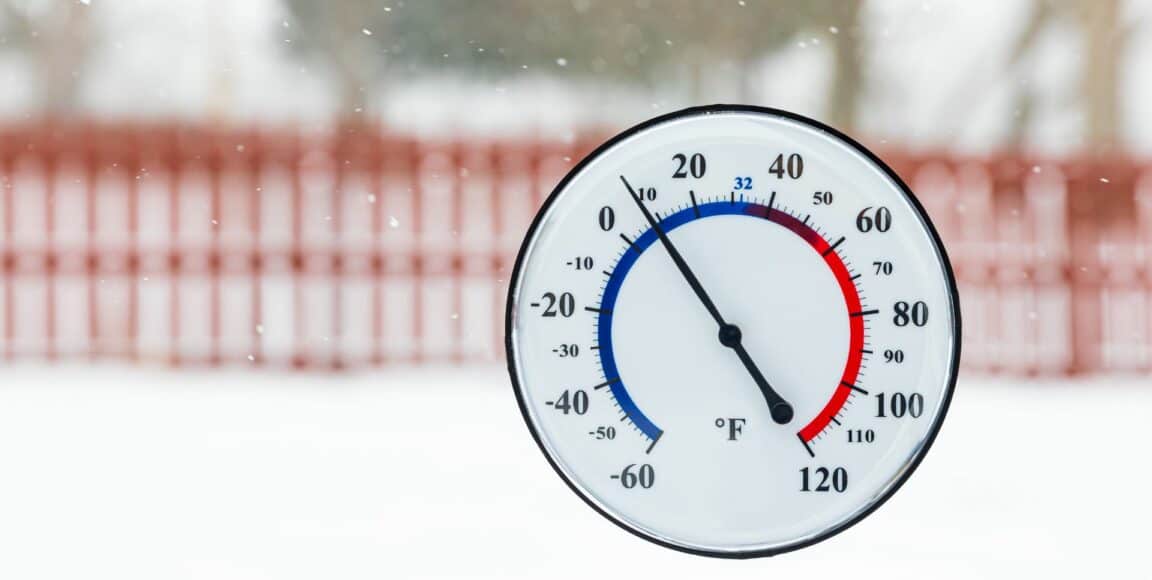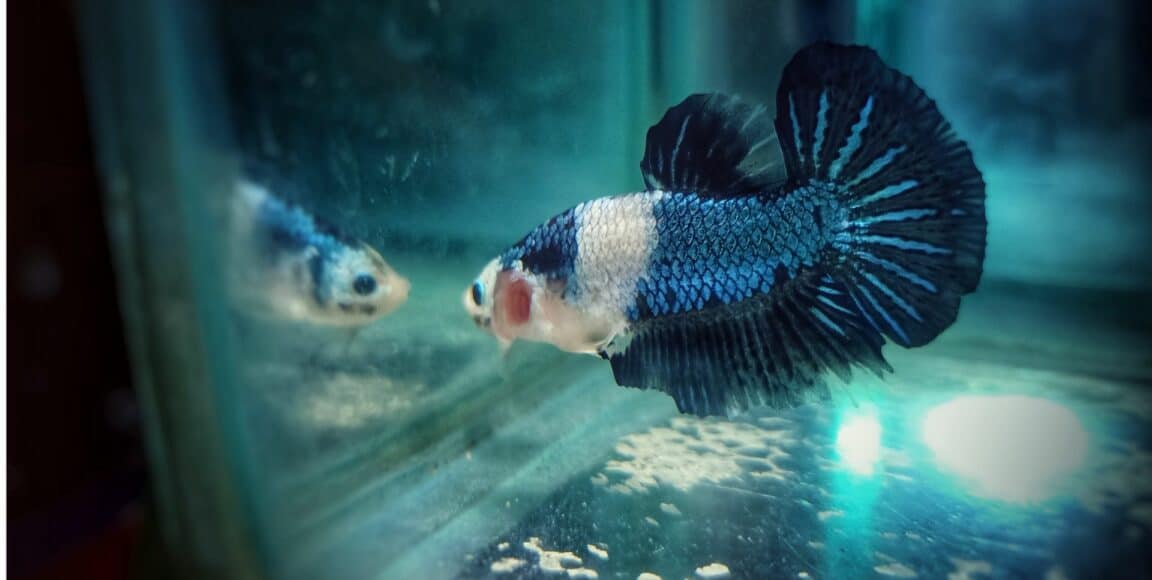Last Updated on January 7, 2023
Have you ever wondered what it would be like to have a pet fish?
Bettas, or Siamese Fighting Fish, are colorful and captivating creatures that can brighten up any room.
But as these tropical fish originate from Thailand and other Southeast Asian countries, these questions always arise: “Can my betta fish live in cold water temperatures?” or “What are the signs my betta fish is cold?”
In this article, we’ll dive into the effects of cold water, the best temperature for betta fish to thrive in, and how you can achieve it.
Table of Contents
Key Takeaways
- Your betta can live in a cold temperature, but it is not ideal and can lead to various health issues.
- Once the temperature drops below 16°C, your pet fish is at a higher risk of dying.
- The ideal temperature to maintain is 78°F to 80°F (25-27°C).
- Some betta temperature shock symptoms include lack of appetite, inactivity, weak immune system, clamped fins, labored breathing, and color loss.
- To keep your betta’s body temperature in the best condition, it’s important to monitor its water temperature with a thermometer, buy a good heater, invest in artificial light, and add some live plants and decor.
How long can siamese fighting fish live in cold water?

Bettas’ lifespan can drastically reduce in colder waters, but they can survive short-term exposure. If it goes under 16°C, your betta can only live for a few hours.
Since their natural habitats are in rice paddies in a tropical climate, betta fish survive and prefer warm water to keep their body temperature in check.
A betta can live its usual 3 to 5 years in a fish tank with an ideal temperature of 78°F to 80°F (25-27°C).
What does cold water temperature do to betta fish?
A new betta fish placed in cold place will not die instantly.
When exposed to cold temperatures below 78F to 80°F (25-27°C), your tank temperature will drop, and they will exhibit the following signs:
Your betta fish will be less active

Hans-Werner Lissmann did a study in 1932 on the attack-response of Betta Splendens, also known as Siamese Fighting Fish. He published his findings entitled The environment of the fighting fish (Betta splendens Regan).
Bettas are territorial, and they flare their gills and fan their fins when they see other bettas. They mimicked it by showing an image of a betta fish.
He noted that the frequency of the attack-response of a Siamese fighting fish at a temperature of 28 degrees Celsius is higher than at a temperature of 22 degrees Celsius despite showing the same stimulus.
This shows that betta fish will do its best to conserve energy at a lower tank temperature.
Your pet fish will lose its appetite
Since bettas are cold-blooded, cold temperatures can slow their digestive system and lower their metabolism. This can lead to more health problems, such as bloating and constipation.
Long-term effects such as dropsy will develop. Dropsy is the process of fluid building up inside a fish most associated with organ failure, which can eventually kill them.
Its immune system will weaken
Once your betta fish is exposed to cold water temperature, stress will build up, and the immune system will weaken.
Slowed metabolism can lead to a higher risk of developing parasitic microorganism-induced diseases such as fin rot and ich.
Poor water quality, system instability, or injury can further deteriorate the betta’s overall health.
Unless action is taken promptly to regulate temperature levels in the tank, colder water will eventually kill your pet fish due to its compromised immune system.
What are the other severe signs that my betta fish is cold?
If you don’t take action soon, your Siamese fighting fish will eventually become sick, sink to the bottom, and die.
And you’ll know that the problem is getting more serious when you observe these signs:
Labored breathing
When your pet fish is laboring to breathe, it will open and close its gills rapidly in an attempt to take in more oxygen.
You may also notice your betta swimming near the tank’s surface, trying to get as much air as possible.
Clamped fins
When your pet fish clamps its fins, it will appear as if they are suddenly shorter. This is because the fins have become constricted or pulled close to their body to conserve energy and warmth.
Losing color

When your Siamese fighting fish is cold, its colors will start to dull and fade. It slowly turns white and loses its vibrancy.
Just note that these are the common signs of stress betta fish, so if your betta is exhibiting any of them, it’s best to check the water temp and quality and act quickly.
How to prevent betta fish temperature shock?
Temperature shock, or thermal shock, is when a betta is suddenly exposed to cold or too hot water temperatures.
The betta temperature shock symptoms include the three above-mentioned signs such as labored breathing, clamped fins, and dulling colors.
To prevent this from happening, ensure you check the temperature of your tank regularly and adjust it when necessary. Here are some best practices to follow:
Have a thermometer for your betta tank
You can prevent your pet fish water temperature shock by giving your fish a suitable environment where it can thrive.
Have an accurate aquarium thermometer and fish tank heater, so you are always aware of the temperature in your betta’s tank.
I recommend you buy a thermometer that you can put inside the tank for better reading. External thermometers that stick to the glass of your fish tank may sometimes be inaccurate.
This may be because of the thickness of the glass of your aquarium or the different temperature of the air surrounding your betta tank.
Invest in a good aquarium heater
This is especially important if you live in an area where the temperature drops below 25°C.
You can get an adjustable heater that will help you maintain the water temperature 24/7 and ensure it stays within the ideal range of 26–28°C.
The good news is that most aquarium heaters nowadays have a built-in thermostat, so you don’t have to worry about overheating. But still, make sure you check the temperature now and then to ensure it’s within range.
Related: Can Betta Fish Live in Tap Water?
Change your betta tank water to the appropriate temperature
This also takes us to another part of the hobby, which is doing water changes to maintain the right body temperature for your betta.
Ensure that the water you add during water changes will not send your betta fish into temperature shock.
A thermometer plays an important role here, but you can also practice acclimation. Acclimation refers to slowly and gradually increasing the temperature of the new water to match that of your betta fish tank.
What you need to do is put your betta fish in a separate container, then slowly add water from the tank to the container drop by drop until it reaches the same temperature.
This way, you are gradually introducing your betta fish to the new temperature and preventing them from experiencing sudden changes to their environment.
Set up a good lighting system for your betta
Lastly, keeping the temperature of your tank steady is also about setting up a good lighting system for your betta. Good lighting can prevent the water temperature from dropping below a certain point.
Artificial lights are the best option because you can control how much and when to turn them on and off.
This way, you can provide warmth for your betta fish, especially at night when the room temperature goes down.
If you don’t have the budget yet, natural light can do but only with certain conditions. Make sure the location of your tank is not exposed to direct sunlight and that it’s away from any draft or air conditioning vents.
But if you want to avoid any risks, I suggest you use an LED light. They don’t release extreme heat, and they are energy-efficient.
Another suitable alternative is a fluorescent light.
However, you need to ensure that your betta won’t be overexposed to light because they also need some time to rest and sleep.
To do so, you can invest in a light timer. This will help you to automatically set the right lighting hours for your betta fish tank.
Add live plants and some decor

Empty tanks tend to get colder more quickly than those with live plants and decorations.
Besides making your tank more attractive, adding live plants and some decoration can also help maintain the temperature in your betta fish tank.
Live plants balance the oxygen in your tank. And decorations like driftwood and rocks provide hiding spots for your betta fish to feel more secure and sheltered from any sudden changes in the environment.
How cold is too cold for a betta?

If the temperature goes lower than 60 degrees Fahrenheit or 15.5 degrees Celsius, then your betta fish will die in a few hours because their bodily functions will stop.
This is like an induced coma done when they euthanize a fish. The water’s temperature needs to go near the freezing point, and the fish falls asleep and dies.
The optimal temperature that Betta fish need, and at which they will indeed thrive, ranges from 76 to 80 degrees Fahrenheit or 24 to 26 degrees Celsius.
Having an aquarium at this temperature range is a hobbyist’s responsibility to give a healthy and happy existence to a betta fish.
An aquarium heater is the best option to provide the preferred temperature for your betta fish. It is a safe idea to set the temperature to 79 degrees Fahrenheit or 26 degrees Celsius.
But we recommend setting the temperature at 81 degrees Fahrenheit or 27 degrees Celsius if you are planning to breed betta fish. This temperature will induce a male betta fish and a female betta fish to spawn.
You can keep the water temperature constant by using an aquarium heater.
Are you worried about overheating your betta fish tank? Do not worry because we have a few examples of aquarium heaters with built-in thermostats.
These detect if it reaches the desired temperature of the water and then shut off the heater. When the water cools by a degree then, the heater turns back on.
Make sure your heater is suited to the volume of your betta fish tank. You can also consider setting up your fish tank in a room that doesn’t get too cold. The recommended wattage may not be enough if the room gets too cold.
Your betta can live for around 3 to 5 years, and it would be great if it lives a happy and healthy life in your care.
Give your betta fish the best environment to thrive by using a submersible aquarium heater and monitoring temperature with an accurate aquarium thermometer.
Frequently Asked Questions
Can betta fish live in cold water?
Yes, betta fish can live in cold water, but it may only last a few hours. Colder temperatures can put your betta fish at risk of developing diseases, so keep the water temperature within the recommended range to give your betta fish the best chance to stay healthy and happy.
Can a betta survive without a heater?
This depends on the area where you live. If the room temperature is already within the recommended range, then your betta fish can survive without a heater. However, if it gets too cold at night or during colder seasons, you should get an aquarium heater to keep your betta fish warm and safe.
What are the signs my betta fish is cold?
If your betta fish is too cold, it may show signs such as loss of appetite, lethargy, or lack of activity. They may also have an increased breathing rate and appear pale or discolored.
How can I keep my betta fish warm?
The greatest method to keep your betta fish warm is using an aquarium heater with a built-in thermostat. This will ensure that the water temperature stays within the recommended range and keeps your betta fish safe and healthy. You should also consider gett
Conclusion
That wraps up our article about the effects of cold temperatures on your betta fish.
As a responsible pet owner, it is important to ensure that the water temperature in your betta fish’s aquarium stays within the recommended range.
This is to avoid cold temperature shock, maintain warm water where your fish can thrive, and save your tropical fish from stress and illnesses.
By providing an optimal environment by investing in a good aquarium heater and monitoring the temperature regularly with an accurate thermometer, you can ensure that your pet will live a long, healthy, and happy life.
We hope this article helps you give your bettas the best care possible!
